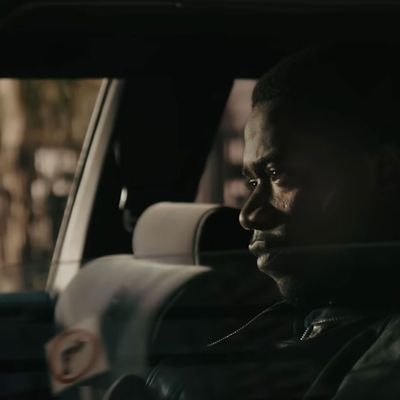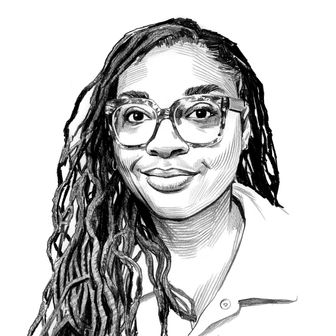
Every year, my parents sojourn to Accra, Ghana, to visit the community my father has cultivated through his many trips to the continent. When they return, you can feel the energy of the trip almost emanating from their pores. Their skin is sun-kissed, their smiles are wider, and they smell of incense and oils. Much like Leon and Wanda, they come back to the States in authentic kente cloth made in the village, bearing gifts and stories about all the beautiful things they experienced. Sometimes their creepily calm demeanors and relaxed eyes are annoyingly juxtaposed with life in this country, where everyone is perpetually rushing as if living on borrowed time. But, for Black Americans, in a lot of ways we are living on borrowed time in a country that has historically been a living hell for descendants of Africans.
Wanda and Leon are confronted with this harsh reality when they return to Los Angeles and witness the decay in the projects they once called home. Though most of what they see is local gang violence and drug addiction, it’s important to contextualize this moment in history across the country. The recession during the early 1980s worsened living conditions for people in poverty and set the stage for the events depicted in Snowfall. As much as Snowfall is one of the best crime shows of our times, it’s also historical fiction, poignantly exploring Black reality during this time.
Last season, Leon professed his love for Wanda, and together they fled the destruction of the neighborhood with dreams of a better future. Leon caught the travel bug after Avi opened his mind to a more global revolutionary approach, telling him about the radical movements outside America. Now, months later, the couple had adapted to life in Accra, but Leon feels he still has to do something for his people back home, even if it’s just tying up loose ends and using his funds to better the community. Wanda is naturally more hesitant; life back in L.A. means dangerously close proximity to the drug that ruined her life. She’s ready to stay in Ghana forever. But Leon makes it clear that she’s an important and permanent part of his present and future … so he puts a ring on it!
The pair have a beautiful ceremony on the beach, Leon wearing an ensemble that blends Western and African styles, very much in the vein of Marcus Garvey’s iconic regalia. My favorite style moment is the Sankofa pin on his hat. Sankofa is a concept from the Akan tribe in Ghana that emphasizes the importance of remembering and honoring the past to create a better future. In Twi, a Ghanaian language, Sankofa literally means “to retrieve.” Sankofa is a recurring theme in this episode for Leon, who is now equipped with more knowledge of his people’s history that he wants to impart to his counterparts back home. This sentiment is reiterated in a quote sprawled on a billboard in the city that reads: “The errors of the past must be corrected in order to reestablish the confidence of our people in a secure future.” The quote is attributed to J.J. Rawlings, who was a prominent political leader and a two-term president of Ghana. However, in my research, I can’t seem to find if he ever actually said it, but it aligns with other things he is quoted as saying. Basically, it’s imperative to repair America’s original sin to truly free Black people.
The accents and attention to detail within the scenes in Accra seamlessly connect Leon’s time in Ghana to the only other home he knows — remember back in the first season when he admitted to living in L.A. his whole life but never visiting the beach? Now he’s one of the most historically important beaches: The shore used to transport Africans to the New World to eventually create the society we know today. Though it was a gorgeous backdrop for Leon and Wanda’s nuptials, they also learn more about the uglier side of its history. They visit Elmina Castle, which is the first slave trade post built on the Gulf of Guinea and is evidence of some of the first instances of European interference on the continent. Though the castle was built by the Portuguese for easier access to the gold trade, after the slave trade became more lucrative than gold, the castle passed through Dutch, then British possession, becoming one of the most important stops in the transatlantic slave trade. Their tour guide explains how slavery in Africa morphed from a wartime tradition between tribes to an insidious and violently forced way of life after Europeans came to exploit the continent. He calls it “our bargain with the devil.” It’s estimated that by the 18th century, 30,000 enslaved Africans passed through Elmina each year, with “The Door of No Return” being their last sight before being transported to hell on a slave ship.
My parents have visited Elmina — my father has gone many times, bringing students from his university along, and my mother has only gone once. She reveres it as one of the most important moments of her life, but not one she’d ever want to repeat. Anyone I’ve spoken to about visiting Elmina describes it as nothing less than visceral, and they almost always note that it feels like past, present, and future converging. I’ve never heard of someone not crying. Wanda and Leon have that same reaction, and Leon is met with a hard truth about his life. Overcome with emotion after walking through the dungeons of Elmina where Africans were held, he compares slavery to the crack epidemic he played a huge part in creating, especially noting how Africans themselves sold their own people. Wanda understands that it’s more systemic than that, but this doesn’t settle Leon’s heart. He says that by selling crack, he essentially wrapped a chain around his people’s necks. He says it might’ve been easier to escape slavery than to escape crack addiction, saying, “If you gave a slave an opportunity for freedom, they’ll take that and never look back. If you gave the same opportunity to a crackhead, they may always look back.”
I don’t necessarily agree with Leon. Many people forget how truly psychologically tortured slaves were, but battling addiction is psychological torture as well, and the effects of the crack he was selling didn’t only impact the individuals who chose to smoke it. Upon their return to America, Leon and Wanda are forced to deal with these consequences. They look almost incongruous with their surroundings, and it’s evident that they themselves feel this awkwardness as well. Maurice debriefs Leon on what he missed out on and why so many people are on guard in the streets with guns. Apparently, Louie and Jerome have been in an all-out war with Franklin, sending people to fuck up his office, to which he retaliated by executing a hit on Louie’s club. Kane and Deon’s people are also swept up in the warfare, with fatal shots being traded between both camps. The craziest rumor? Franklin almost killed Deon while he was taking a shit in a public bathroom.
Leon is in disbelief but makes his rounds to figure out exactly what’s going on. First, he goes to Deon, but he doesn’t find out too much important information. Deon simply says Franklin is crazy and envious and informs him that Franklin lost his money, leading him to raid Jerome’s warehouse. Next, he visits Jerome and Louie with a wedding present in tow. He’s met with a less-than-warm welcome, and Jerome voices his resentment regarding Leon’s abrupt exit. They ignore his pleas for peace, telling him that he isn’t family and ordering him to leave. His final stop is to his childhood best friend. He shows up at Franklin’s with hamburgers, and they catch up. Leon opens up about his state of mind and what he’s learned from Avi and his time in Africa. Franklin informs Leon about Avi’s disappearance but then draws a clear line in the sand: Leon either needs to pick a side or “get the fuck out” while he still can.
Final Forecast
• As Leon becomes reacquainted in L.A., Gustavo and Teddy head to Costa Rica to get Avi’s last shipment of guns. Gustavo, still working with the DEA, has gotten them some evidence in the form of pictures of his drop with Louie, but is being pressed to get more. In Costa Rica, after a particularly violent encounter with the people who are handling the arms deal in Avi’s absence, they find out that the Russians have entered the chat and want to blow up the operation! I have so many questions. How did Teddy know to look in that screw? What did the note say? Is Reuben involved?
• Wanda’s homecoming is devastating. She shows up at her grandmother’s door, clean of drugs and carrying the necklace she bought for her in Accra. Her grandmother refuses to let Wanda in the house, still burned from Wanda’s abuse when she was under the influence. She closes the door in Wanda’s face, further emphasizing the permanent effect of crack on this community.
• This episode contained some of the best cinematography of the series. I could write a dissertation praising the wide shot of Leon looking out one of the windows of the castle. As it pans out, stains on the outside of the vast white structure create the shape of a cross, with Leon directly in the center, crucified — just genius.
• This might be me reading too deep (which is kind of my job), but the camera work when Franklin, Veronique, and Cassandra are at dinner intrigued me. Specifically when Franklin was the focal point but you could see Cassandra in the mirror behind his head, which gave me the feeling that Franklin needed to watch his back. And then, as we see the full table at the end, Veronique is positioned between the two, facing Cassandra but with her hand stretched to hold Franklin’s while Franklin is very isolated on his end of the table. Something about this whole setup conveyed to me that Veronique’s alliances could be all over the place.


